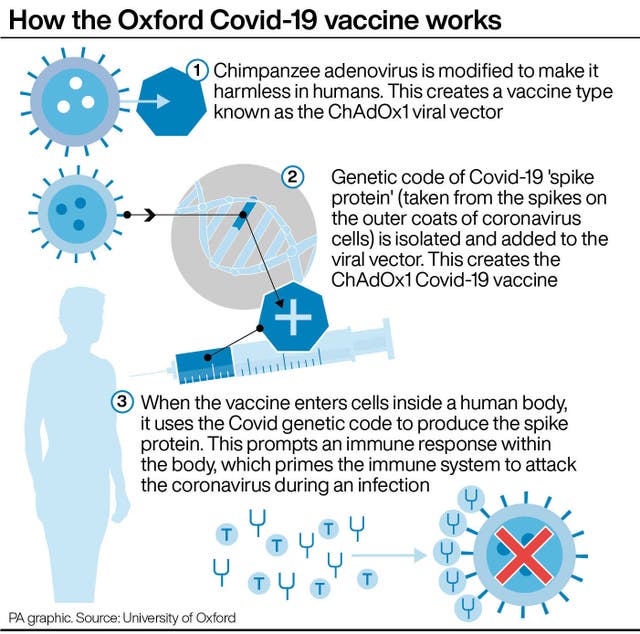AstraZeneca defends its vaccine data against US claims
Millions of doses of the AstraZeneca vaccine have been given to people across the UK.

AstraZeneca has defended its use of Covid-19 vaccine data after US authorities suggested some results may not be the most up to date.
The firm said figures released on Monday showing the jab was 79% effective against coronavirus and 100% effective against severe disease was stood up in all of the data it has looked at.
It comes as US federal health officials said results from the US-led trial may have used “outdated information”.
The US Data and Safety Monitoring Board (DSMB) said in a statement that it was concerned that AstraZeneca may have provided an incomplete view of the efficacy data.
But AstraZeneca said: “The numbers published yesterday were based on a pre-specified interim analysis with a data cut-off of February 17.
“We have reviewed the preliminary assessment of the primary analysis and the results were consistent with the interim analysis.
“We are now completing the validation of the statistical analysis.
“We will immediately engage with the DSMB to share our primary analysis with the most up-to-date efficacy data.
“We intend to issue results of the primary analysis within 48 hours.”
The vaccine, which has been the subject of controversy in Europe over concerns about links to very rare blood clots, was found to be 100% effective at keeping people out of hospital with severe illness.
Some 32,449 people across all age groups took part in the phase three trial in the US, Chile and Peru, with a total of 141 cases of symptomatic Covid-19 reported.

The results showed that among people aged 65 and over, there was 80% protection against developing Covid-19.
The degree of effectiveness against symptomatic Covid-19 was even higher than observed in the Oxford-led clinical trials.
AstraZeneca hopes the jab will protect against severe disease from all coronavirus variants.
Dr Peter English, a retired consultant in communicable disease control and former editor of Vaccines In Practice magazine, said he found the DSMB statement from the US “problematic”.
He said: “If you present data, stating the period in which the data were collected, how can the data be ‘outdated’?
“The AstraZeneca press release did say it was on ‘interim’ data. There may be more recent data; but that would not normally ‘outdate’ or invalidate the interim results.”
He said the US statement showed “shamefully bad communication” that “left room for speculation which could be damaging for vaccine uptake”.
Stephen Evans, professor of pharmacoepidemiology at the London School of Hygiene & Tropical Medicine, said it was not unknown for the DSMB to disagree with investigators over interpretation of trial results but this “is usually done in private”.
Meanwhile, Dr Stephen Griffin, associate professor in the school of medicine at the University of Leeds, said the move by the DSMB “highlights the importance of data being provided at the same time as summaries being made public”.
The European Medicines Agency, the World Health Organisation and the Medicines and Healthcare products Regulatory Agency (MHRA) have all declared the vaccine safe and effective.




